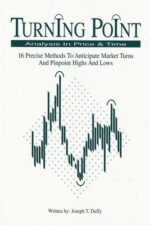The Little Book of Stock Market Cycles: How to Take Advantage of Time-Proven Market Patterns
$12.25
The Little Book of Stock Market Cycles will show you how to profit from these recurring stock market patterns and cycles. Written by Jeffrey Hirsch, President of the Hirsch Organization and Editor-in-Chief of the Stock Trader’s Almanac, this reliable resource explains why these cycles occur, provides the historical evidence behind them, and shows you how to capture consistent profits from them moving forward. In addition to describing his most widely followed cycles and patters, Hirsch also discusses both longer term boom-bust economic cycles and shorter term tendencies involving the best days, weeks, and months of the year to trade the market.
Introduction:
There is no magic formula to make trading or investing easy. Nothing can replace research, experience, and a healthy dose of luck. There is, however, a methodology investors can employ to mitigate losses and enhance returns. Nineteenth century philosopher George Santayana once pronounced that “Those who cannot remember the past are condemned to repeat it.” This is the cornerstone of my research for the Stock Trader’s Almanac, which was founded by my father Yale Hirsch in 1966. By analyzing and studying the markets from a historical perspective, modern-day market action and events can be put into historical context. Whether you are a short-term trader or a longer term investor, being aware of historical and seasonal patterns and tendencies is helpful and valuable.
The Little Book of Stock Market Cycles is an amalgamation of the most effective indicators, patterns, and seasonalities that have been painstakingly researched and vetted over the nearly 50-year history of the Stock Trader’s Almanac. Those who study market history are bound to profit from it! To be a successful trader or investor, you must understand how the market behaves under normal conditions. Whether it is in a secular bull market or a secular bear market, Wall Street moves to a predictable cadence governed by the passage of time. Recurring events such as the presidential election every four years, end-of-quarter portfolio rebalancing, options and futures expirations, tax deadlines, and holidays have a predictable influence on traders and investors.
People’s day-to-day lives, such as paying bills, going on summer vacations, holiday shopping, and 401(k) contributions have an indelible effect on the market. Humans are creatures of habit. Knowing the habits of your fellow traders and investors will make market events, once dismissed as chance, unfold before you with apparent outcomes. Even in today’s world of “high frequency” trading and 4G smart phone communication, old-time daily regimens prevail and shape the intraday moments of the stock market in much the same manner as they have for decades.
Exogenous events, whether foreign or domestic, have been impacting the market since our forefathers gathered under the buttonwood tree. In today’s geopolitical cauldron, an investor who doesn’t comprehend the difference between peacetime markets and wartime markets is a sitting duck. Though the market never reacts the same way every time, knowing how it performed in the past will give you an edge in future times of crisis.
However, this is not an exact science as patterns and tendencies change and shift. Major cultural shifts and technology have had a profound impact on markets and their behaviors. Farming made August the best month of the year from 1900 to 1951, but now that less than 2 percent of the U.S. population farms, August is one of the worst months. Technology has increased access to markets and significantly speeded its response. In 1965, millions of shares were traded daily on the NYSE, now it is billions.
Contents:
- Cutting through the Bull
- War and Peace
- A Century of Booms and Busts
- The Coming Boom
- Your Portfolio Gets Political
- Open Season for Stocks
- Aura of the Witch
- Autumn Planting
- Winter of Content
- Spring Harvest
- Summer Doldrums
- Celebrate Good Times
- Don’t Sell on Friday
- Picking the Ripe Trade
The Little Book of Stock Market Cycles: How to Take Advantage of Time-Proven Market Patterns By Jeffrey A. Hirsch pdf
| Author(s) | |
|---|---|
| Format | |
| Pages | 154 |
| Publication Year | 2012 |









